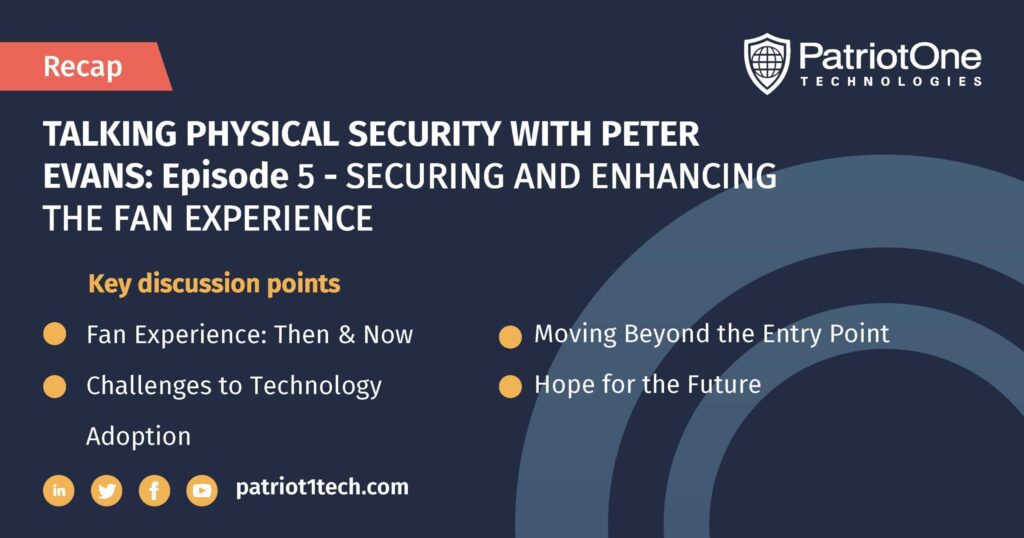
For our latest episode of Talking Physical Security, Patriot One CEO Peter Evans spoke with Dr. Lou Marciani, director and co-founder of Innovation Institute for Fan Experience (IIFX) Global, an organization dedicated to being the next great leap in, and trusted authority to, providing exceptional fan experience.
Peter and Lou discussed how much the fan experience at sporting events has changed from 10 years ago – both the good and the bad – as well as challenges to technology adoption. Here are three key areas of focus.
The fan experience then and now
Peter and Lou agreed one of the biggest differences regarding the fan experience is the increased need for security, which naturally comes after the staggering number of attacks and mass casualty events in recent years. And while many fans find increased security measures inconvenient but necessary, the technology being used has also created opportunities to elevate the fan experience. As part of the digital transformation of the security industry, stadiums, venues and professional sports teams are choosing new technologies which not only serve their purpose but also elevate the fan experience. For example: modern weapons detection technology which provides more accurate threat detection while also enabling a fast and frictionless entry for patrons.
One of the biggest problems since the COVID-19 pandemic has been staffing shortages, which is consistent across industries. Many entertainment organizations hadn’t anticipated losing personnel permanently, especially once they were operating at full capacity again. When restrictions were starting to ease and stadiums were only operating at 15-20% capacity, staffing wasn’t as much of an issue but now that stadiums are mostly operating at 100% but with fewer staff, operators are looking to technology to help them solve this problem.
The biggest challenges to technology adoption
Lou discussed how the physical security industry is very conservative – and rightfully so – as people’s lives and safety are on the line. There are many executives that want to be early adopters of new technology, but they want to see it work before they buy it. This obviously creates a challenging juxtaposition. He says he’s seen this for many years, and although COVID-19 accelerated the technology adoption timeline a little, it can still take a year-and-a-half or more to fully implement new security technology.
He said another challenge is budgets, which we’ve discussed in prior webinars. However, 2022 and 2023 are especially difficult times for stadiums and entertainment venues, because although they are welcoming guests back at full capacity, they are still reeling from losing profits over the past two years, when COVID-19 forced them to cancel in-person. However, Lou stresses that visionary leaders will understand the true value and potential of implementing this new technology. After all, crisis creates change and innovation.
Moving beyond the entry point
Most physical security vendors focus on protecting patron and staff entrances, and while important, they don’t completely secure the facility. If someone has malicious intent, the damage could start long before the entry point – in the parking lot or even before the event. In reality, the patron experience starts miles away from the stadium – the minute someone logs online to buy a ticket or check the dates of an event, and that’s when security should start. Stadiums and entertainment venues should take a holistic approach to the environment to really elevate the experience for patrons and fans, to ensure they arrive and leave with a positive attitude.
Technology has come a long way – artificial intelligence (AI) is enabling organizations to do everything from scanning the internet for discussion of malicious activity, to spotting and alerting security guards when weapons are approaching the stadium. This kind of monitoring – spanning the entire event lifecycle – can help stop mass casualty events in their tracks, so patrons feel safe going to events.
Hopes for the future
Discussing what kind of technologies they would like to see in the future of stadiums, Lou and Peter touched on the priority of increasing knowledge and using this information to proactively protect patrons. For example, with the way patrons buy tickets and use social media to voice opinions and views, they volunteer much more information than before, and operators have the opportunity to understand the potential risk they could bring to an event. Additionally, having this information can lead to an enhanced experience.
Finally, they discussed wanting to see new stadiums being built using different kinds of sensors and ways to obtain information, and using that to make operations more efficient and effective. This could include integrated technology for ticket scanners, physical security checks, for example.
IIFX’s next event will be in December in Las Vegas – where technology and the fan experience will be front and center. It will be a great opportunity for stadiums – new and old – to identify what their needs are and find the technology providers that can help.
Click here to view the full webinar. To learn more on Patriot One’s security solutions or to set up a conversation with a representative, please contact us.
